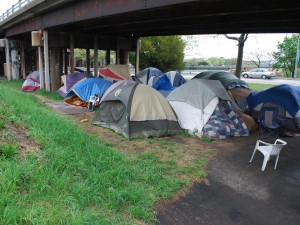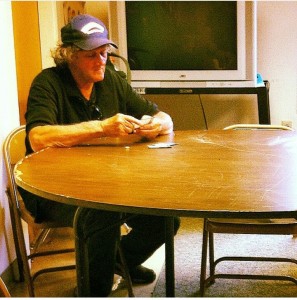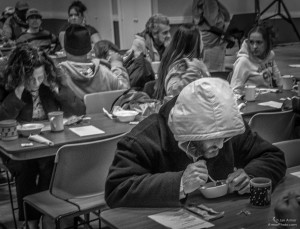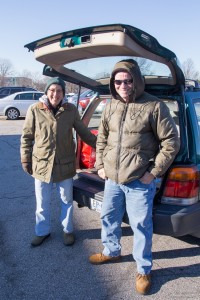By Elizabeth Filipe
As the winter spilled into the new year, icy conditions forced inhabitants of the East Coast to run an uncomfortable gauntlet between two solid adversaries: frigid weather and uncompromisingly icy roads. Roiling gray skies continued to coat cities and lawns with thick blankets of snow, encrusting roadways and threatening the demise of roofs laden with far more than their fair share.
Each evening in my little New England city, Eskimo-garbed residents made their miserable sprints from work to the car and from the car to house or apartment where they shivered into furry robes and sagged into comfy armchairs. I imagine many of them settled in front of the TV, basking in Travel Channel episodes replaying the blissful sands of tropical islands. The harsh wind scraped around the corners of the house, but they, the hard-pressed and hardworking, had escaped into the welcoming warmth of home.
Not every inhabitant of the city escaped the cold, however. Tucked far from the side of Highway 95, just visible over the ragged peaks of snow, a tent city pulsated with every gust of wind. Huddled inside were men and women I know well. Some wore gloves from the Salvation Army, others donned old dirty jeans and second-hand boots provided by a compassionate local ministry. They, too, had come home, but not to welcoming warmth.
Rene, a wizened man approaching his seventieth year, lives in a battered shack just inside the city limits. Always ready to extrapolate upon his French heritage with pride, Rene corners me faithfully during our weekly soup kitchen encounters.
“The weather,” he nods, “it’s a brutal thing, a brutal thing.”
He proceeds to give a detailed exposition of weather trends in and around New England, while waving his gloves, holed like Swiss-cheese, towards his tent-dwelling companions seated at tables nearby.
The winter has made Rene’s shack a relative icebox and he has no money to heat it. Unhindered, he goes to the library, Monday through Friday, each day, all day. This resourceful, consistent response to the lack of warm housing has given him a mind saturated with information.
I sit beside him as he bends appreciatively over a steaming bowl of chili and rice. Becoming educational as it often does, our topic of conversation turns to national landmarks. Without hesitation, Rene listed the height of the St. Louis Arch by the number of stories, and a subsequent Google fact check proves him right. Not for the first time, I marvel at this aging man’s swift recall and vibrant intellect. I wonder how he has come to know so much while owning so little.
As a fiercely zealous soup kitchen server, I inwardly script methods by which I can turn the conversation to the miraculous story of rescue wound up in Noah’s Ark, but Rene cheerily dives into the details of another ship, one called the RMS Titanic. With an astonishing level of clarity and an engaging grasp of the more dramatic details, Rene proceeds to teach a history lesson more reminiscent of Tom Clancy than David McCullough. Noah’s Ark falls by the wayside, my well-intentioned evangelism snagged upon the lesson this eccentric, charming Frenchman is teaching.
Yet, the real lesson was so easy to miss.
Sadly, we can be so caught up “fixing” others that we lose sight of our own need for a Savior’s rescue. We get so wrapped up in our own evangelistic checklists, missional agendas, or Romans Road vocabulary that we overlook the importance of cultivating our relationship with Christ in our own lives. We’ve mastered the evangelistic speeches, the handing out of tracts paired with soup and salad, and the delegation of tasks to members of outreach teams who seamlessly and busily shuttle goods to the needy. Our desire to be “relevant,” “effective,” or “active” in the community has in many ways produced a church whose ministry to the poor resembles an expertly oiled machine.
Julia Duin, author of Quitting Church, has gone so far as to make a startling prediction. “In 15 years,” she writes, “present trends continuing, the church in America will be half of what it is.”
Is it possible that our rush to reach the community has distracted us from our own essential need to commune with the God we hope to share? Could it be that allowing our distractible hearts to focus on doing for him first and abiding in him second has kept us from sharing his truth with the power so present in the gospel?
Could it be the ones we subconsciously consider to be “the least of us” have much to show us about the personal, quiet abiding of the Kingdom?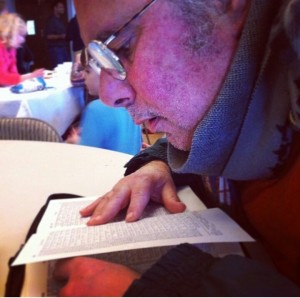
“It’s too cold to stay at home,” Rene says. “I’ve been going to the library every day. I have to go, so I read all day.”
The large winter blizzard outside chases Rene towards the books indoors. Forced by the storm to abide among encyclopedias, this Frenchman with a ragged gray jacket, emerges bearing a wide understanding of American history, the dreams of inventors, and the elegant way the seasons change.
What if we were to abide in Christ’s word like that? What if we identified the storm of life as a place we cannot live and ran daily, weekly, hourly, all day to abide in Jesus?
Instead of focusing only upon the loaves and fishes we hand out to the homeless, let’s pursue a deeper relationship with the One who multiplies. Let’s practice the spiritual habit of abiding in the warmth of Christ’s Word. Let’s faithfully run from the storm of distraction and daily burrow into his wisdom, his heart, his library of redemption.
As John R. W. Scott observes, “We should not ask, ‘What is wrong with the world?’ for that diagnosis has already been given. Rather, we should ask, ‘What has happened to the salt and light?’”
Let’s allow the needy we serve to prompt us towards eternal renewal. Their actions may serve as a reminder, not just of their need for warmth from the storm, but of our need to run again towards the Light.
One local ministry doing just that is Midnight Moment Outreach. Ralph Davis and Rose Preston cruise the streets of South Providence every Saturday morning and Wednesday evening, summer or winter, in rain or snow or 100 degrees, they are out there looking for folks in need. They offer a sandwich, a pastry, a hot chocolate, or maybe a pair of fresh socks or warm gloves, even a little hope and human kindness. For additional Information please contact them at mmoutreach@yahoo.com or call 401-837-0861.

